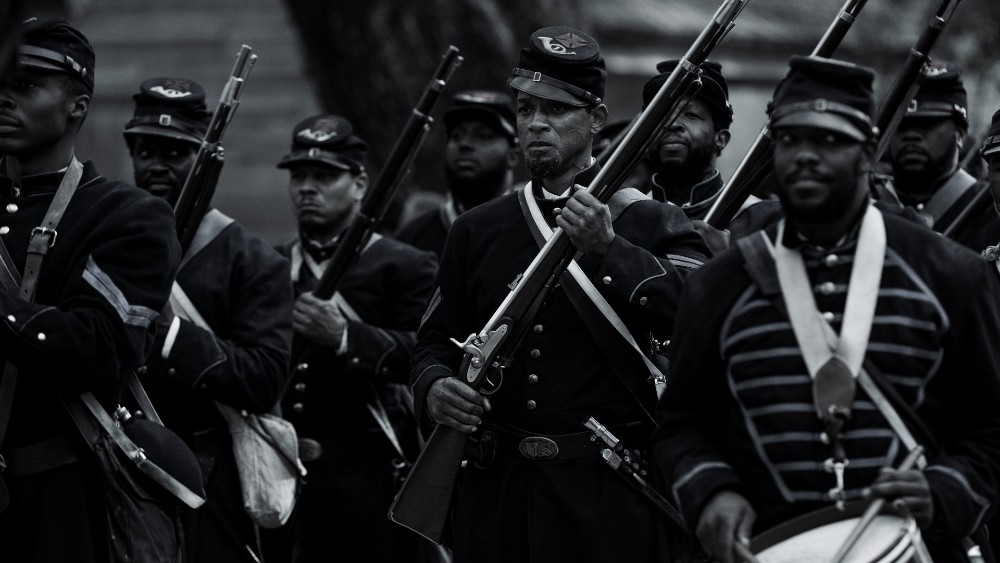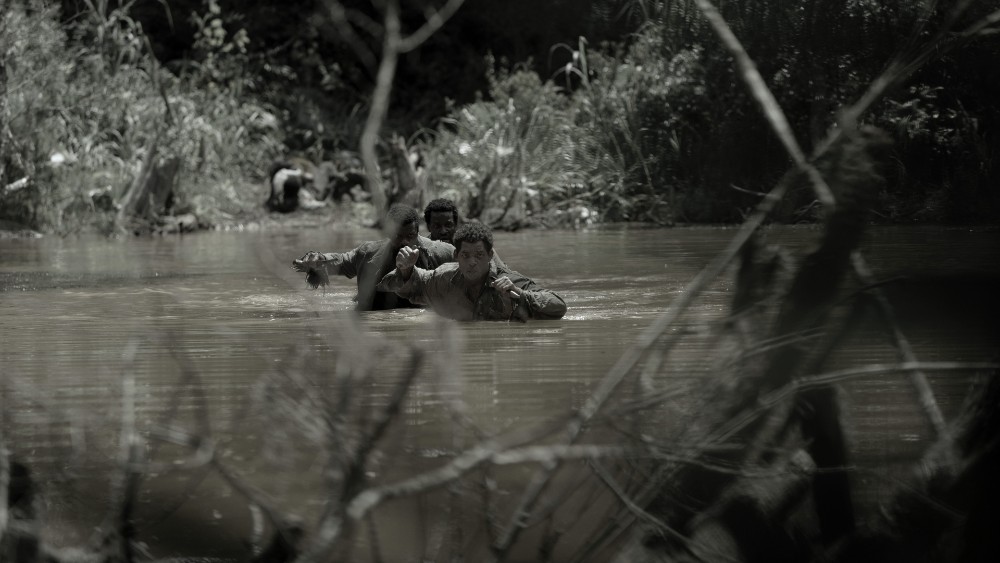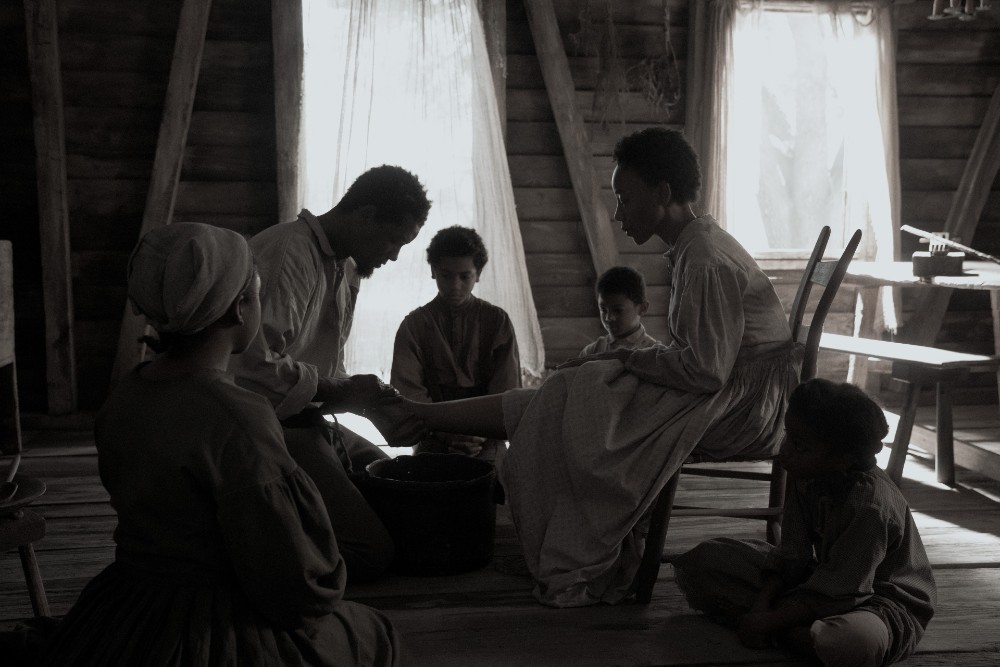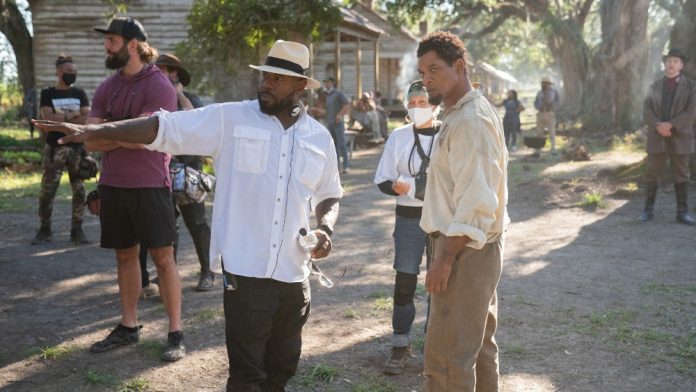Will Smith‘s powerful new slavery-era drama, Emancipation, originated with a mere photograph — the devastating 1863 image of an enslaved man whose back is severely scarred from repeated whippings and other untold abuse. Known as “The Scourged Back,” that one image made it clear to Americans that slave owners were abusing their power over other humans, and that it had to stop immediately.
Almost 160 years later, Smith is playing that man, known merely as “Peter,” in a sprawling epic that follows his plight and flight through the swamps of Louisiana as he flees from the ruthless and relentless Jim Fassel (Ben Foster), the man commissioned with bringing him back.
To direct the film, Smith called upon Antoine Fuqua, a seasoned filmmaker who has demonstrated an ability to shift between genre films like The Equalizer and more dramatic fare such as 2016’s Southpaw starring Jake Gyllenhaal. In fact, Fuqua’s career dates back over 30 years to when he directed many music videos. His third feature film, Training Day, teamed him for the first time with Denzel Washington, who won his first leading actor Oscar playing a corrupt L.A. detective. The two men have gone on to make three more movies since then, plus Fuqua recently reteamed with Gyllenhaal for last year’s Netflix drama, The Guilty.
Above the Line chatted with Fuqua over Zoom, where the director talked about what drew him to Emancipation and finding his North Star for the project along with Smith, who has said he hopes the film will be judged on its own merits and not overshadowed by the controversy surrounding last year’s Oscars.

Above the Line: I recently spoke with Ben Foster, and he told me about the conversation the two of you had before he came on. Were you aware of the Scourged Back photo prior to embarking on Emancipation, and did you put this project together, or was it something that Will brought to you to direct?
Antoine Fuqua: I knew about the photo, obviously, just growing up and seeing the image in my life. The script Bill Collage wrote before anyone was involved, he was developing it. And then Will got the script before I did, I believe, through CAA or some version of that. And then Will wanted to get it to me, so my agent sent it to me. Once I read it, I called Will and I was just like, ‘This is a serious project. Do we want to do this?’ And he said he was in, [so] we both committed to each other, and that was that.
ATL: You had quite a run with Denzel, having made four movies with him, so I was a little surprised that you had never worked with Will before, as I assume you’d met him over the years. What were the early conversations you had with him as far as how you wanted to present Peter’s story?
Fuqua: We talked a lot about our reason, our North Star. It really is an important subject matter that’s deeply personal — we knew that was gonna be painful. Most importantly, we talked about family, and we talked about love, and we talked about faith, and keeping that as the driving heartbeat of the story — faith and love and family and strength. There’s a diary that we have in research where Peter talked about his life. He dictated it to someone at the union camp, I believe, and he talked about that famous photo. He was whipped, and he was in a coma for three months. During that time, he saw God, and as you think about that, and you look at the photo of him, there’s a certain strength and dignity there. Where does that come from if you’re a slave [having spent] your whole life being beaten down? We came to the conclusion, it had to be from faith. It had to be, because he knew you can’t bondage a person’s spirit or their mind. You can certainly brainwash them, but once you realize that emancipation is about your spirit, about being free, about mentally and physically being free, it’s not just bondage. It’s not just physical bondage. We talked a lot about that, and how this character wouldn’t have any fear. Not fear as we know it, because man already did the worst they could do to him. His biggest fear was never seeing his family again.

ATL: Are there any descendants of Peter who are still alive? I know his last name was never known, but I wonder if the movie, in bringing more attention to his story, will encourage some of his family members to come forward.
Fuqua: I hope some of his descendants show up, but no, there’s no research, obviously, with Africans anywhere in the world — it was all stripped away. It’s so hard to find any information about him, really. In fact, online, they call him “Gordon” sometimes — they have his real name. Part of it is that all the stuff in the movie is fact-based [and] his diary talks about, or there’s an article that talks about it. Fassel is a real character as well. Ben obviously came in and created a character that was much more grounded than what was written, and more relatable to today, in a weird way. I think Ben’s Fassel was from Ohio in our movie, but in reality, he was, I think, from Louisiana, so we were trying to make it feel more contemporary in that way. But our conversations, even with Ben, were always about just trying to find the truth in these characters.
ATL: You fully committed to authenticity by filming in Louisiana in the summer, which must have been absolutely grueling. Ben also mentioned that the set was hit by a storm or a hurricane, so how was it working in that environment, not just for you but also for the actors and for your crew? Was it a tough shoot?
Fuqua: It’s the most difficult thing I’ve ever done, and a lot of the crew said that it was the most difficult thing they’ve ever done. [There] was heat over 100 degrees, [then] the hurricane came and wiped us out [so we] had to change and find all new locations. We were down for like a month. Remember, it was the height of COVID. We had to have people get tested every day before they can [even] get out of the car. That means I only had a certain amount of time a day to get what I needed to tell my story.
The voter suppression [act] is why we moved from Georgia to Louisiana, as well. I always wanted to do that anyway, because the original story took place in Louisiana, [so] that worked out, but it cost us a lot of money. It was extremely difficult to make the movie, but well worth it.

ATL: The look of the movie is particularly interesting. A lot of it is in black and white, but there are moments where the colors come through, albeit still muted. Was that a process done in post? How was it decided where to enhance the colors or keep them muted?
Fuqua: Bob Richardson, my DP, is a great DP; the guy’s the best. When Bob first called me and we talked about the movie, he wasn’t fully committed yet. He told me not to get him eaten by an alligator or bitten by a snake. That was the first thing — he’s scared to death of snakes. He said, ‘So how do you see the movie?’ And I said, ‘Brutal and beautiful.’ We started talking about it, and I said, ‘It feels like an alien planet. Like it doesn’t feel like we did this to each other here on Earth. How is that possible? How do human beings treat each other this way?’
When we were out scouting, we talked every day with Rob Legato, my visual effects and second unit director. We started to put together these montages of images, and little by little, it started to feel like this alien planet, but yet, obviously, [still] Earth. And then you see a little green come through, and we would play with this look, so that you knew you were still obviously grounded in the reality of these places. It was a little bit different in that way.
What it started to feel like was more [like] the perspective [of] the slave than the slave owner. A lot of movies felt like they were from the perspective of the slave owner. I’ve had some people say, ‘Well, are they going to be singing? Are we going to have some hymns?’ I was like, ‘Can you imagine singing in the field, over 100-some degrees, bugs everywhere, guys with guns and dogs?’ I don’t think the slaves were singing and dancing in the fields. Maybe on Sunday, they had one day to do that, called “Come Sunday,” but to me, this [film] is more from the slave’s perspective than the slave owners’ perspective. Gone With the Wind is [all] gold and light, and everything’s beautiful and romantic. There was nothing romantic about slavery. It was all forced labor, and it was harsh.
ATL: The last time we spoke, I asked you about Equalizer 2 (which you hadn’t made yet). Now, you and Denzel are doing Equalizer 3, so have the two of you talked a lot over the years about where you might want to take the character in another movie? Also, any chance we might see him meet Queen Latifah’s Equalizer on the big screen?
Fuqua: That can never happen, no, no, no. We do [talk]. This one is more personal, for sure, and probably the last one for me and Denzel, as far as the Equalizer series goes. But it’s much more personal. We do talk about it a little bit when we see each other. This one all takes place in Italy and has a different feel to it.
Emancipation is now playing in select theaters, and it will begin streaming on Apple TV+ on Dec. 9. Click here to read our interview with Ben Foster.



